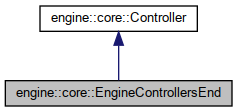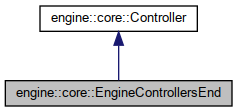This controller does nothing and together with EngineControllersEnd it servers as a sentinel controller for marking the engine controllers. More...
#include <Controller.hpp>
Inheritance diagram for engine::core::EngineControllersEnd:

Collaboration diagram for engine::core::EngineControllersEnd:

Public Member Functions | |
| std::string_view | name () const override |
 Public Member Functions inherited from engine::core::Controller Public Member Functions inherited from engine::core::Controller | |
| virtual | ~Controller ()=default |
| void | before (Controller *next) |
| void | after (Controller *prev) |
| const std::vector< Controller * > & | next () const |
| bool | is_enabled () const |
| Controller will execute as long this function returns true. More... | |
| void | set_enable (bool value) |
| Enables or disables the controller based on value. The engine::core::App executes only the enabled controllers, except for the Controller::poll_events function, that's executed always. By default, controllers are enabled when registered. More... | |
Additional Inherited Members | |
 Static Public Member Functions inherited from engine::core::Controller Static Public Member Functions inherited from engine::core::Controller | |
| template<typename TController > | |
| static TController * | get (std::source_location location=std::source_location::current()) |
| Serves as a single access point for all the Controller types throughout the code base. Make sure to register the controller via App::register_controller before calling this function. More... | |
Detailed Description
This controller does nothing and together with EngineControllersEnd it servers as a sentinel controller for marking the engine controllers.
This makes it easier for the concrete App implementation to order its custom controllers before/after engine controllers.
Here is an example of how to make the user_controller execute after all the engine controllers:
auto user_controller = ...;
user_controller->after(engine::core::Controller::get<EngineControllersEnd>());
Member Function Documentation
◆ name()
|
inlineoverridevirtual |
Returns the controller class name; used for logging.
- Returns
- Controller name
Reimplemented from engine::core::Controller.
The documentation for this class was generated from the following file:
- engine/include/engine/core/Controller.hpp